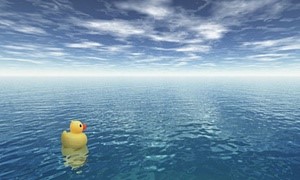
According to Greek legend, it took the hero Odysseus 10 years to reach home by journeying across the Mediterranean Sea after the Trojan War.
But that’s nothing. So far an armada of plastic toys has been at sea for 29 years. And some of them have gone halfway around the world.
The great Plastic Duck Odyssey began on January 10, 1992, when a Pacific storm slammed the container ship Ever Laurel somewhere near the International Date Line. The ship was journeying from Hong Kong to Tacoma, Washington, where it was scheduled to deliver, among other things, thousands of bathtub toys made in China.
The storm sent a dozen containers overboard. One of them split open and spilled its contents: 28,800 yellow ducks, blue turtles, green frogs, and red beavers.
Those durable, watertight plastic creatures, collectively called Friendly Floatees, were intended to delight American children at bath time.
Instead they have become playful international symbols and the object of careful scientific scrutiny.
It appears that approximately 18,000 of the toys went south, where they washed up on the shores of Australia, Indonesia, and South America.
The other 11,000 or so have taken a much more interesting journey. Caught by oceanic currents, they traveled around the northern Pacific for a few years. Some of them washed up in Alaska and British Columbia. Others rode the big surf at Hawaii. Still others became frozen in Arctic pack ice. Traveling with the ice at the rate of about a mile a day, they finally reached the northern Atlantic Ocean about 15 years ago.
Some of the ducks, turtles, and frogs – on their way to Cape Cod and the coast of Maine – drifted over the spot where Titanic sank in 1912. Still others, caught by the Gulf Stream, have begun to turn up in Scotland and England – 17,000 miles from the point where their Pacific bath began. Scores of the toys have become collector’s items, going for as much as $1,000 in online auctions.
Along the way, it dawned on oceanographer Curtis Ebbesmeyer – looking for something interesting to do in his retirement – that this was a once-in-a-lifetime opportunity to track ocean currents.
Even after centuries of human adventures on the seas, scientists know next to nothing about the oceanic “rivers” of warm and cold water that circulate from continent to continent. Ebbesmeyer, with the help of hundreds of people around the world who are faithfully reporting yellow duck and red beaver sightings, is beginning to fill in the gaps in our knowledge.
Here’s one thing we already know: Things that are set adrift on the ocean don’t stay in the same place for very long.
Never a truer word was spoken about the words we speak.
Whenever we open our mouths, it’s as if we are emptying an industrial container. Our words go everywhere. And after we have spoken we have no way of retrieving our subtle digs, our self-serving exaggerations, our unsolicited judgments, and our snarky commentaries. Just ask anyone who has ever been a marriage partner, a business associate, or a friend. Some of our most regrettable comments are still washing up on distant shores 29 years later.
The words we speak have the capacity to change reality.
A baseball umpire says, “Strike three!” and the batter has to return to the dugout. A wedding officiant says, “I now pronounce you husband and wife,” and a new marriage is off and running. A judge looks down and says, “I sentence you to six months in prison,” and half a year of freedom is immediately subtracted from the defendant’s life.
Something actually happens when we speak. Think about that time, years ago, when you were tired. You were irritated. You had had it up to here. You decided to remove all doubt about your true feelings, and let fly with a verbal barrage that inflicted deep wounds. Your words still seem to be “out there” somewhere, endlessly rolling in on the tide.
The apostle James marveled at the tongue’s capacity both to heal and to harm.
“With our tongues we bless God our Father; with the same tongues we curse the very men and women he made in his image. Curses and blessings out of the same mouth! My friends, this can’t go on. A spring doesn’t gush fresh water one day and brackish the next, does it?” (James 3:10-11)
To this day there are communities in the American West, such as Sweetwater and Bad Water, that advertise the quality of the local spring. But there is no community named Sweetwater Unless I Haven’t Had My First Cup of Coffee. James urges us to decide what we intend to accomplish with our words, no matter what the circumstances.
It’s too late to retrieve comments we wish had never left our mouths. But it’s still in our power to do something else that will change reality.
Starting today, we can bless others.
That will no doubt include speaking less. And listening carefully. And cherishing silence. And refusing, above all, to go negative:
“Let us therefore encourage one another, and build each other up” (I Thessalonians 5:11).
By God’s grace, such words of blessing can ride the currents and still be washing up on shores for years to come.
